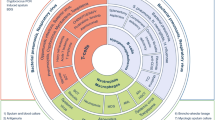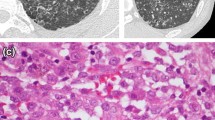Abstract
Objectives
Idiopathic interstitial pneumonias (IIPs) are associated with an increased risk of lung cancer. Glasgow prognostic score (GPS), which uses serum C-reactive protein (CRP) and albumin levels to indicate systemic inflammatory response and nutrition level, has been reported to be a predictor of overall survival in patients with various types of cancer. We evaluated the usefulness of GPS for prediction of survival of patients with both lung cancer and IIPs following a lung resection procedure.
Methods
Patients with IIPs who underwent lung cancer resection from January 2006 through December 2015 were investigated. Routine laboratory measurements, including serum CRP and albumin for determining GPS, were performed before the operation. Univariate and multivariate analyses with a COX proportional hazards regression model were used to identify independent risk factors for overall survival (OS), relapse-free survival (RFS), cancer-specific survival (CSS), and other disease-specific survival (ODSS).
Results
A total of 135 patients underwent lung resection during the study period. Multivariate analysis selected sublobar resection (p = 0.035), UIP pattern (p = 0.025), and GPS of 1–2 (p = 0.042) as predictive factors associated with OS, while GPS of 1–2 (p = 0.039) was shown to be a predictive factor associated with RFS. Multivariate analysis also revealed pTNM (p < 0.001), usual interstitial pneumonia pattern (p = 0.006), and GPS of 2 (p = 0.003) as predictive factors associated with CSS, while univariate analysis indicated pTNM (p = 0.042), GPS of 1 (p = 0.044), and %DLCO (p = 0.038) as predictive factors associated with ODSS.
Conclusion
GPS is an independent prognostic factor of OS and RFS in lung cancer patients with IIPs undergoing a lung resection procedure. Furthermore, a GPS of 2 was found to be associated with CSS following lung cancer resection, while a score of 1 was associated with ODSS.


Similar content being viewed by others
References
Hubbard R, Venn A, Lewis S, Britton J (2000) Lung cancer and cryptogenic fibrosing alveolitis. A population-based cohort study. Am J Respir Crit Care Med 161:5–8
Harris JM, Johnston ID, Rudd R, Taylor AJ, Cullinan P (2010) Cryptogenic fibrosingalveolitis and lung cancer: the BTS study. Thorax 65:70–76
Tanita T, Chida M, Hoshikawa Y, Handa M, Sato M, Sagawa M et al (2001) Experience with fatal interstitial pneumonia after operation for lung cancer. J Cardiovasc Surg 42:125–129
Chida M, Ono S, Hoshikawa Y, Kondo T (2008) Subclinical idiopathic pulmonary fibrosis is also a risk factor of post-operative acute respiratory distress syndrome following thoracic surgery. Eur J Cardiothorac Surg 34:877–880
Sato T, Teramukai S, Kondo H, Watanabe A, Ebina M, Kishi K et al (2014) Impact and predictors of acute exacerbation of interstitial lung diseases after pulmonary resection for lung cancer. J Thorac Cardiovasc Surg 147:1604–1611
Chida M, Kobayashi S, Karube K, Hayama M, Tamura M, Ishihama H et al (2012) Incidence of acute exacerbation of interstitial pneumonia in operated lung cancer: institutional report and review. Ann Thorac and Cardiovasc Surg 18:314–317
Forrest LM, McMillan DC, McArdle CS, Angerson WJ, Dunlop DJ (2003) Evaluation of cumulative prognostic scores based on the systemic inflammatory response in patients with inoperable non-small-cell lung cancer. Br J Cancer 89:1028–1030
Forrest LM, McMillan DC, McArdle CS, Angerson WJ, Dagg K, Scott HR (2005) A prospective longitudinal study of performance status, an inflammation-based score (GPS) and survival in patients with inoperable non-small-cell lung cancer. Br J Cancer 92:1834–1836
Crumley AB, McMillan DC, McKernan M, McDonald AC, Stuart RC (2006) Evaluation of an inflammation-based prognostic score in patients with inoperable gastro-oesophageal cancer. Br J Cancer 94:637–641
Elahi MM, McMillan DC, McArdle CS, Angerson WJ, Soukop M, Johnstone J et al (2004) Score based on hypoalbuminemia and elevated C-reactive protein predicts survival in patients with advanced gastrointestinal cancer. Nutr Cancer 48:171–173
Ishizuka M, Kubota K, Kita J, Shimoda M, Kato M, Sawada T (2012) Impact of an inflammation-based prognostic system on patients undergoing surgery for hepatocellular carcinoma: a retrospective study of 398 Japanese patients. Am J Surg 203:101–106
Glen P, Jamieson NB, McMillan DC, Carter R, Imrie CW, McKay CJ (2006) Evaluation of an inflammation-based prognostic score in patients with inoperable pancreatic cancer. Pancreatology 6:450–453
Read JA, Choy ST, Beale PJ, Clarke SJ (2006) Evaluation of nutritional and inflammatory status of advanced colorectal cancer patients and its correlation with survival. Nutr Cancer 55:78–85
Kobayashi S, Karube Y, Nishihira M, Inoue T, Araki O, Sado T et al (2016) Usefulness of inflammation-based prognostic score in patients undergoing lung metastasectomy for colorectal carcinoma. World J Surg 40:1632–1637. https://doi.org/10.1007/s00268-016-3459-4
Kobayashi S, Karube Y, Nishihira M, Inoue T, Araki O, Maeda S et al (2016) Postoperative pyothorax a risk factor for acute exacerbation of idiopathic interstitial pneumonia following lung cancer resection. Gen Thorac Cardiovasc Surg 64:476–480
The Japanese Respiratory Society Guideline homepage on internet. http://www.jrs.or.jp/modules/guidelines/index.php?content_id=49
The American Thoracic Society Official Document on internet. https://www.thoracic.org/statements/insterstitial-lung-disease.php
Sato T, Watanabe A, Kondo H, Kanzaki M, Okubo K, Yokoi K et al (2015) Long-term results and predictors of survival after surgical resection of patients with lung cancer and interstitial lung diseases. J Thorac Cardiovasc Surg 149:64–69
Kanaji N, Tadokoro A, Kita N, Murota M, Ishii T, Takagi T et al (2016) Impact of idiopathic pulmonary fibrosis on advanced non-small cell lung cancer survival. J Cancer Res Clin Oncol 1(42):1855–1865
Yotsukura M, Ohtsuka T, Kaseda K, Kamiyama I, Hayashi Y, Asamura H (2016) Value of the Glasgow prognostic score as a prognostic factor in resectable non-small cell lung cancer. J Thorac Oncol 11:1311–1318
Proctor MJ, McMillan DC, Horgan PG, Fletcher CD, Talwar D, Morrison DS (2015) Systemic inflammation predicts all-cause mortality: a Glasgow inflammation outcome study. PLOS One 2:10
Author information
Authors and Affiliations
Corresponding author
Ethics declarations
Conflict of interest
All authors declare that they have no conflicts of interest.
Rights and permissions
About this article
Cite this article
Kobayashi, S., Matsumura, Y., Karube, Y. et al. Inflammation-Based Prognostic Score Predicts Postoperative Survival of Patients with Interstitial Pneumonia After Undergoing Lung Cancer Resection. World J Surg 42, 2143–2152 (2018). https://doi.org/10.1007/s00268-017-4426-4
Published:
Issue Date:
DOI: https://doi.org/10.1007/s00268-017-4426-4




